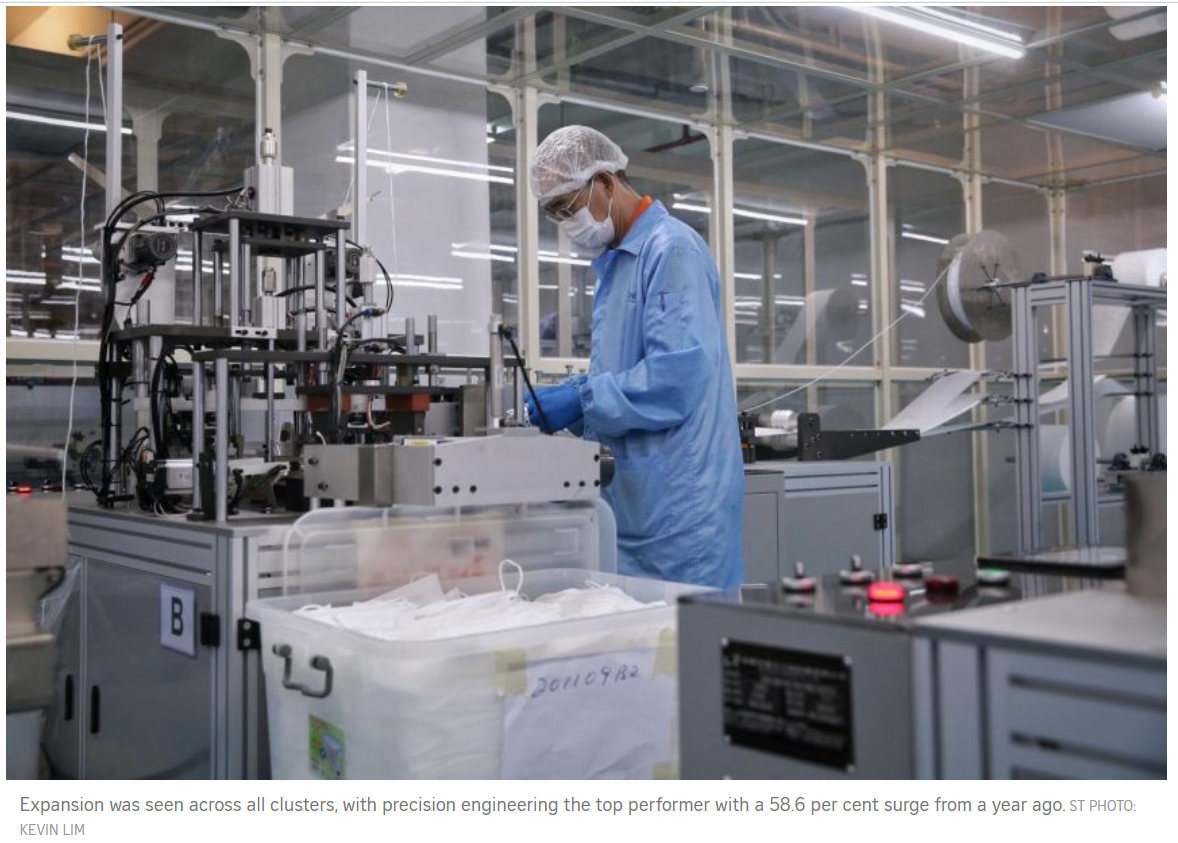Singapore factory output jumps 30% in May, in seventh straight month of growth
SINGAPORE – Manufacturing output in Singapore saw a huge jump in May, helped by a low base a year ago amid Covid-19 circuit breaker measures.
Factory production expanded 30 per cent year on year – a seventh straight month of growth, according to data released by the Economic Development Board on Friday (June 25).
This exceeded the 24.1 per cent growth forecast by economists polled by Bloomberg and the adjusted 2.3 per cent increase seen in April.
Excluding the volatile biomedical manufacturing segment, output rose 29 per cent.
On a month-on-month seasonally adjusted basis, overall factory output increased 7.2 per cent. Excluding biomedical manufacturing, production grew 9.8 per cent.
Barclays regional economist Brian Tan noted that this month-on-month rise in May came despite the tighter Covid-19 community measures in Singapore.
“This beat market expectations and supports our view that manufacturing activity again escaped significant disruption from the imposition of pandemic-related restrictions,” he said.
Manufacturing contributes to over one-fifth of Singapore’s gross domestic product.
Expansion was seen across all clusters, with precision engineering the top performer with a 58.6 per cent surge from a year ago.
This was supported by a 73.4 per cent jump in the machinery and systems segment, which benefited from higher production of semiconductor equipment to cater to the strong capital investment in the global chip industry.
The precision engineering cluster grew 22.7 per cent in the first five months of the year, compared to the same period in 2020.
Electronics manufacturing rose 23.2 per cent, with all segments seeing a higher level of production. The semiconductors segment in particular grew 25.5 per cent, supported by demand from 5G markets and a low production base a year ago.
The cluster saw a 22.9 per cent increase in the first five months of 2021 compared to the same period a year ago.
UOB economist Barnabas Gan said that the electronic and precision engineering clusters are expected to continue supporting the overall manufacturing sector, on the back of global growth and a positive external environment, noting how these two clusters have seen strong growth year-to-date.
“Separately, the economic recovery seen in Singapore’s key trading partners amid a global economic recovery environment should also support the chemicals cluster for the year ahead,” he said.
Chemicals production increased 16.2 per cent year on year in May, with growth across all segments. The cluster expanded 10.3 per cent between January and May this year, compared to a year ago.
But Mr Gan also acknowledged that Covid-19 risks across Asia remain elevated, which suggests that uncertain transport-related demand may continue to limit growth in Singapore’s transport engineering cluster.
Maybank Kim Eng analysts Chua Hak Bin and Lee Ju Ye pointed to how low base effects from last year’s circuit breaker measures bumped up the year-on-year growth figures for other clusters.
The transport engineering sector saw a 44 per cent expansion in May, on the back of a low base a year ago amid domestic Covid-19 measures and movement restrictions at foreign worker dormitories which negatively affected production.
The biomedical manufacturing segment saw a 35.6 per cent increase in May, with higher export demand for medical devices driving growth in the medical technology segment.
Higher production of active pharmaceutical ingredients and biological products also supported the 38 per cent year on year rise in the pharmaceutical segment.
General manufacturing output saw an uptick of 27.8 per cent in May due to a low base. Growth in the miscellaneous industries and printing segments outweighed the decline in the food, beverage and tobacco segment, which was due to weaker export demand.



 Thailand
Thailand




